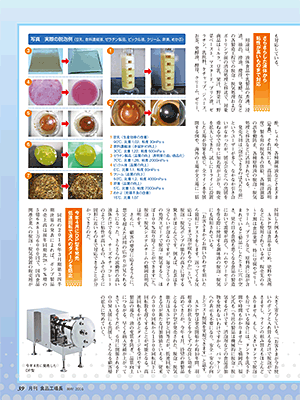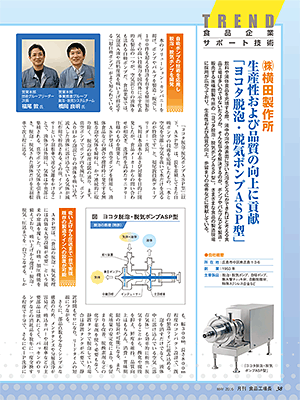Media Coverage
Contributing to improved productivity and quality
"YOKOTA Defoaming/Degassing Pump ASP type"
|
| Featured in MONTHLY FOOD PLANT MANAGER issued on Sunday, May 1, 2016 |
 |
|
 |
 |
 |
| Reprinted from MONTHLY FOOD PLANT MANAGER No.229, May 2016 issue, Page
38 to 39 |
|
|
MONTHLY FOOD PLANT MANAGER May 2016
TREND
Food Industry
Support Technology
Yokota Manufacturing Co., Ltd.
Contributing to improved productivity and quality
"YOKOTA Defoaming/Degassing Pump ASP type"
|
This product was introduced in "TREND / Food Industry / Support Technology"
in MONTHLY FOOD PLANT MANAGER, No. 229, May 2016.
|
|
The bubbles in liquids and surface bubbles when charging beverages and
liquid food products are problems that many food processing plants must
deal with. The solution to these problems is the "YOKOTA Defoaming/Degassing
Pump ASP type" produced by Yokota Manufacturing Co., Ltd., manufacturer
and seller of products such as pumps and valves. The pump has been widely
adopted at various food processing plants, contributing to improved productivity
and quality, as well as improved yield ratio.
Company overview
Location: 1-3-6 Minami Yoshijima, Naka-ku Hiroshima
Established in 1953
Main products: Defoaming/degassing pumps, self-priming pumps, non-water
hammer check valves, automatic control valves, special stainless steel
alloy, among others
Defoaming/degassing pump developed applying self-priming pump technology
Promoting itself as a company finding solutions to water and liquid handling
needs, YOKOTA manufacturers and sells pumps and valves, and holds more
than 100 patents. One of the representative products displaying its high
technological strength, both domestically and abroad, is its self-priming
pump which can deliver liquid even mixed with air. The "Enhanced Self-Priming
Pump" is well known in the food industry for pumping and transferring
liquids mixed with air bubbles or high-viscosity liquids.
|
|

|
"The YOKOTA Defoaming/Degassing Pump ASP type (hereafter, ASP type)
is a pump applying the self-priming pump technology accumulated over many
years. Its special feature is transferring water only after separating
and discharging the air from the water," says Atsushi Fukuo, technical
group leader and deputy general manager.
The initial development objective was handling rust in tap water, however,
the steady stream of inquiries from food product manufacturers led to the
development of a sanitary-specification pump with high cleaning performance.
The ASP type, in combination with an interlocked vacuum pump, instantly
and continuously discharges wasteful bubbles and gas occurring when blending
and agitating liquid food products. The principle behind the defoaming
is as indicated in the figure. First, the vacuum pump depressurizes the
pump internally, the liquid mixed with bubbles is suctioned into the pump
via the inlet, and the gas dissolved in the flowing liquid is extracted
by depressurization.
After this, centrifugal separation is applied using an impeller, known
as an inducer, which pushes the liquid to the periphery and accumulates
the gas in the center. The vacuum pump draws out the gas, and only defoamed/degassed
liquid is transferred to the next process by the main impeller.
|
Pumping to pressure feed achieved with single unit
Set up on existing manufacturing line possible
The ASP type has overturned conventional notions that food product defoaming/degassing
requires expensive, large equipment. Equipped with self-priming and pressurization
functions, the single unit manages everything from pumping to agitation,
defoaming/degassing, and pressure feed. In addition, with its compact design
coming in at about 300 mm width and 800 mm length, it can be assembled
to an existing processing line.
Not only does it eliminate bubbles, but also by efficiently extracting
and discharging air (dissolved gas) dissolved in the liquid, oxidation
and decomposition is suppressed and freshness is maintained. This makes
it possible to improve quality and extend the consumption and expiration
dates. Additionally, the yield ratio is also improved because the filling
quantity is stabilized. There is no need for chemical additives such as
deoxygenating agents, and there is no need for a holding tank in cases
where a holding tank was used for defoaming, thus holding time is reduced
to zero, which leads to shorter lead times.
Further, because the pump has a minimal number of parts and a simple structure,
maintenance and disassembly, and cleaning are easy. The main parts such
as the suction cover and impeller are of sturdy construction, and consumable
parts such as the O-ring packing only require a replacement after a number
of years of use, and CIP cleaning is also supported.
Support from smooth liquids to high viscosity products
The intended use is for defoaming/degassing processing at each stage in
the manufacturing process such as the boiling, maceration, extraction,
oil pressing, agitation, fermentation, and preservation and defoaming processing,
and transfer prior to bottling of liquid food and dairy products, and for
various targeted products including milk, soy milk, fruit juice, vegetable
juice, vegetable paste, mustard, pudding liquid, gelatin, dairy beverages,
ketchup, juice, tea, fermentation liquid, yeast, cream, jelly, vinegar,
soy sauce, and various seasoning liquid (photos).
In addition, it is also used for supplying degassed water for high-quality
(high transparency) ice making, prevention of mis-operation of various
measuring instrument, and defoaming/degassing processing and transfer of
various raw material liquid.
|
|

|
When sales of the pump first began, there were no enquiries because many
users considered bubbles to be a matter of course, however, after displaying
the pump at a number of exhibitions, recognition increased gradually and
sales began growing. Examples of use include factories which set the pump
on a single line as a trial and after realizing the effectiveness, set
pumps on all of their lines. Also, there are examples of overseas factories
which set up the pumps at all their factories all at once.
The ASP type can be used for products such as food, paint and detergent,
however, 60-70% of sales are from the food industry. In particular, there
is a high demand for the pump in the production of food products such as
tofu, jelly, cream, and pudding, in which the raw material liquids containing
bubbles leave holes when made into products, detracting from the appearance
and texture. The pump has also been adopted for defoaming/degassing of
seasoning liquid used in ham and sausage making.
According to Yoshiaki Hashioka on the defoaming/degassing system team,
"When we get an inquiry from a customer, we first have them test run
the pump. The response we get back is almost always one of surprise at
the high defoaming/degassing efficiency, expressed to the extent that 'Its
ability to remove bubbles goes beyond expectations'. For example, even
though tea contains nearly 50% bubbles, defoaming/degassing at a processing
speed of 250 L per minute can remove nearly 100% of the bubbles."
Further, while responding to customer requests, it became apparent that
the pump has a wide application which goes beyond assumption. It is now
understood that the pump can handle products with high viscosity such as
cheese and chocolate, and near-solid products such as miso paste.
|
Sales Launch of DP type in April of this Year
Low speed rotation prevents damage to liquids
According to the third-quarter financial results ending in March 2016,
announced by the company, sales of pump products totaled 568,816,000 yen,
a 28.9% increase compared with the same period the previous year, in which
the growth in sales of defoaming/degassing devices to the domestic food
product-related industries has made a large contribution.
According to Mr. Hashioka, "Customers can have the bubbles removed
from their products by simply replacing the pump they're currently using
without having to reconfigure the line. And, if customers have been using
large settling tanks to do defoaming, labor time and effort for washing
tanks is no longer required." Mr. Fukuo also adds, "Our products
simply defoam/degas mechanically. And, because there is no need for the
use of food additives such as defoaming agents, such indications on packaging
are also unnecessary, which realizes improved safety and assurance, and
reduces cost."
The efficiency of the ASP type has been improved over the past 10 years
since its launch by implementing changes little by little such as impeller
shape changes, and the launch of sales of the much anticipated new DP type
pump began in April of this year. Although defoaming/degassing efficiency
is the same as the ASP type, the lower rotation speed is a new, added value.
Operation is enabled at a slower rotation speed of 1,500 revolutions from
the current 3,000 revolutions. What this means is, for products which are
easily damaged by the application of high rotation speed, liquid alterations
are prevented which leads to improved quality. Sales of the pump are already
rising, but the company intends to further expand its customer segment
with exhibition of the pump at the FOOMA exhibition to be held in June.
MONTHLY FOOD PLANT MANAGER, May 2016
Copyright for this article is with JAPAN FOOD JOURNAL CO., LTD.
For details of this product, please refer to Defoaming, Degassing Pump DP, ASP type. |